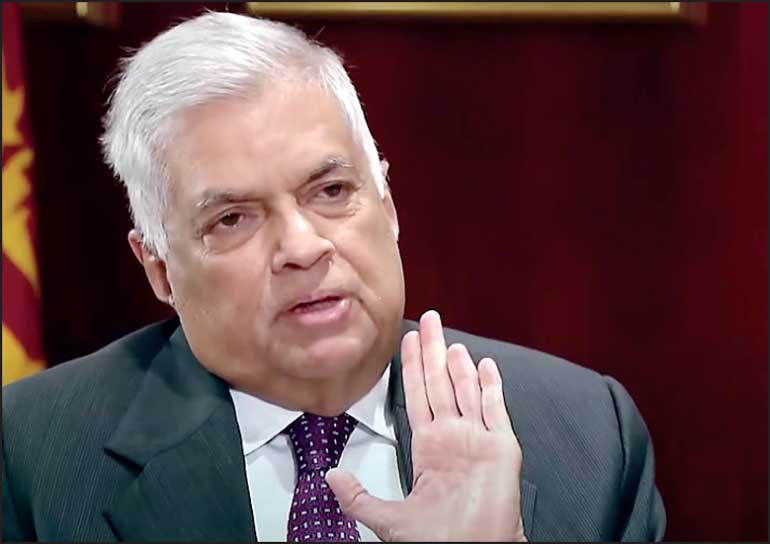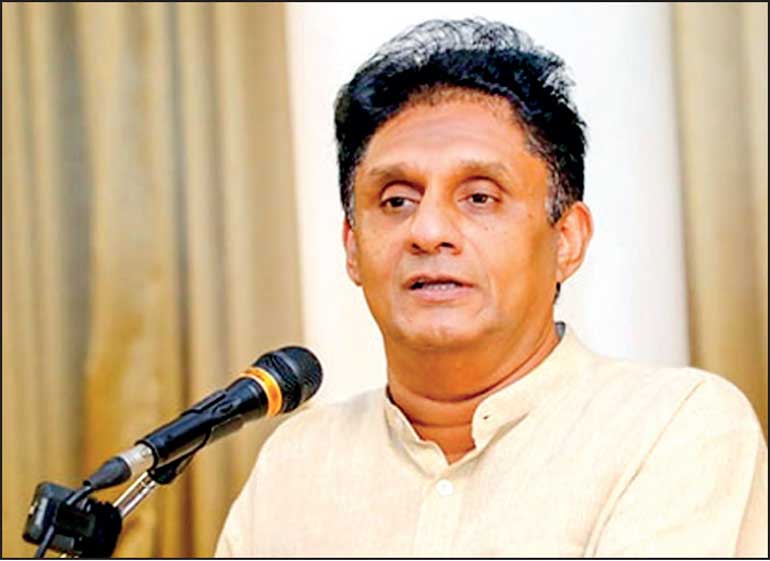Saturday Feb 21, 2026
Saturday Feb 21, 2026
Wednesday, 3 September 2025 00:28 - - {{hitsCtrl.values.hits}}

UNP leader Ranil Wickremesinghe

SJB leader Sajith Premadasa
 The upcoming United National Party (UNP) annual convention this Saturday (6 September 2025) will be unlike any other in its long history. It will be the first major event organised by an Opposition party since Ranil Wickremesinghe’s arrest and release, and the UNP is expected to use the heightened public and media attention to its advantage.
The upcoming United National Party (UNP) annual convention this Saturday (6 September 2025) will be unlike any other in its long history. It will be the first major event organised by an Opposition party since Ranil Wickremesinghe’s arrest and release, and the UNP is expected to use the heightened public and media attention to its advantage.
Wickremesinghe’s planned “special announcement” alone would give the convention weight, but this year’s meeting is significant for more than optics and symbolism. For the first time in years, circumstances appear to have created the space for dialogue between the UNP and the Samagi Jana Balawegaya (SJB). The fact that Wickremesinghe has invited former presidents Mahinda Rajapaksa and Maithripala Sirisena further underlines the attempt to shape this gathering not only as a party event, but as a forum for broader Opposition realignment – and potential alliance building.
Opening the door to reconciliation
The significance of the convention can be framed in two dimensions. First, it raises the question of whether this moment will mark the beginning of a serious reconciliation between the UNP and SJB. Second, it will test whether the event can serve as a platform for constructing a broader Opposition front.
On the latter point, the Opposition remains deeply fragmented. The Sri Lanka Podujana Peramuna (SLPP), as indicated through General Secretary Sagara Kariyawasam, has made clear it is not prepared to enter into a formal alliance, though it has hinted at supporting joint Opposition efforts against the Government. The SJB, despite being the dominant parliamentary Opposition party over the past four elections, has evolved to be known as a distinct political organisation rather than a mere offshoot of the UNP. Its leaders have constructed a separate social democratic identity, claimed an independent electoral base, and articulated themselves as the face of Opposition politics. The Opposition space in Sri Lanka today is multipolar to a degree never seen before, and the UNP convention takes place against that complex backdrop.
Reconciliation has not emerged naturally. Relations between the UNP and SJB have remained strained despite repeated attempts at mediation. The SJB has presented itself as the legitimate successor to the Opposition mantle, often accusing the UNP leadership of insularity and authoritarianism. The UNP, in turn, has portrayed itself as the guardian of continuity and experience. Wickremesinghe’s arrest altered this dynamic. His detention has triggered a sense of solidarity across Opposition ranks. Sajith Premadasa’s visit to Wickremesinghe during his stint at hospital carried symbolic importance. It indicated that personal and political divides, however deep, could be temporarily set aside when confronted by a shared adversary, even if for the purpose of good optics. In that sense, the Government may inadvertently have achieved what years of intra-Opposition negotiations failed to accomplish: opening a space for dialogue.
The question of inheritance
 Nevertheless, potential dialogue must find a panacea for the crisis at the heart of the UNP–SJB relationship.
Nevertheless, potential dialogue must find a panacea for the crisis at the heart of the UNP–SJB relationship.
SJB General Secretary Ranjith Madduma Bandara recently remarked that the two groups were like a family, with disagreements being natural, and the door being open for anyone who leaves to return. The metaphor is appealing, but limited. Families may quarrel and reconcile, but nothing serves to test and dissolve familial bonds more than disputes over inheritance.
In the case of the UNP and SJB, the dispute is precisely in this vein: who inherits the soul, history, and legitimacy of the UNP tradition? Would Sajith Premadasa’s SJB uniting with the UNP resemble the parable of the prodigal son, welcomed back with open arms? And if so, what of those who remained loyal during the lean years, who stayed with the UNP when it was reduced to a single parliamentary seat? These questions cut to the core of the UNP/SJB political identity and legitimacy, and would be keenly felt within the ‘family’.
It is suffice to say that the party rank and file, and its disillusioned vote base (best embodied in the results of the 2020 General Election), would find succour and healing in the reunification of the grand old party. However, both parties (though perhaps more keenly the SJB) would find itself in the perilous position of losing its identity in doing so. Moreover, the mechanics of how reunification will be practically embodied is important and can be equally divisive: whose policies will be prioritised, and how would candidates and leadership hierarchies be decided?
Beyond past loyalties
Yet focusing only on inheritance risks obscuring the wider stakes. Reconciliation between the UNP and SJB is not only about past loyalties but about the political future. A divided Opposition has allowed the Government to manoeuvre with relative ease. Even as rumblings of discontent with governance grow, Opposition parties have failed to present themselves as a credible alternative. Voters disillusioned with political elites see little reason to invest hope in a fragmented Opposition. Reconciliation, therefore, is not just an internal party matter but one with national implications.
At the same time, reconciliation faces serious obstacles. The SJB has successfully branded itself as a viable electoral force. In presidential and parliamentary contests, it has emerged as the main competitor to the ruling party. On the one hand, for the SJB leadership, subsuming their identity within the UNP would be a strategic mistake. For the UNP, on the other hand, reconciliation is a chance to reclaim relevance and prove that it remains a political force rather than a relic. These competing calculations make compromise difficult. The inheritance question thus merges with strategic concerns about survival and political positioning.
The wider Opposition landscape
The possible presence of Rajapaksa and Sirisena at the UNP convention must also be read in this light. Neither figure commands the influence they once did, but their participation symbolises a potential widening of the Opposition umbrella. Rajapaksa still retains a loyal base, particularly among Sinhala Buddhist voters, while Sirisena represents a smaller but not insignificant bloc. Their attendance suggests Wickremesinghe’s strategy is not only to rebuild ties with the SJB but to explore the contours of a much larger alliance.
This broader coalition, however, is fraught with contradictions. Can parties with starkly different records and constituencies realistically cooperate beyond tactical gestures? Or is their cooperation destined to remain superficial, united only by opposition to the current Government?
Here the experience of Sri Lankan politics offers cautionary precedents. Opposition unity built only on the principle of removing a common adversary has rarely translated into durable governance once power is achieved. In more recent times, the Yahapalana experiment of 2015 remains a stark example: a coalition united to defeat Mahinda Rajapaksa fractured under the weight of ideological and personal rivalries, resulting in a dearth of good or governance. If the UNP–SJB reconciliation is to endure, it cannot rely solely on shared antagonism toward the Government. It must develop a vision that goes beyond the language of expediency.
Electoral stakes and voter perception
The next presidential and parliamentary elections are many years away, and the probability of Provincial Council elections in the near future remain remote. However, Opposition parties, for their own success, would do well to prepare proactively. A reconciliation that produces the inklings of a common presidential candidate or at least a coordinated parliamentary strategy would dramatically alter the political landscape. Early preparation, a la the SLPP during the inter-election years of 2015-2018, would build opposition credibility and strengthen cooperation. Conversely, failure to reconcile would risk repeating the pattern of fragmented opposition, where multiple candidates split the vote and allow the incumbent to prevail.
Voter perception also matters. For many Sri Lankans, political elites are indistinguishable in their pursuit of power. A reconciliation between the UNP and SJB risks being read not as a principled decision but as a cynical power-sharing arrangement – a reiteration of entrenched political elitism as it were. To counter this, both parties must articulate why their coming together serves the public interest rather than their own survival. If reconciliation is framed only as elite bargaining, it will deepen rather than reduce voter cynicism.
Risks of symbolism without substance
None of this is to suggest that reconciliation is inevitable. It is possible that the convention produces only symbolic gestures without meaningful follow-through. The inheritance dispute, unresolved and emotionally charged, may prove too great to overcome. Neither faction is absolved of guilt in making reconciliation difficult. Sajith Premadasa may decide that the risks of unity outweigh its benefits, while Wickremesinghe may calculate that maintaining independence preserves his leverage.
Moreover, Rajapaksa and Sirisena may attend the convention but remain unwilling to commit to genuine cooperation, and may even serve to complicate, rather than complement, efforts to bring the SJB and UNP together. Such an outcome would leave the opposition as fragmented as before, with the Government benefiting from the disunity of its challengers.
Still, moments of crisis sometimes generate opportunities that routine politics does not. The arrest of Wickremesinghe has paradoxically created an opening for dialogue. The question is whether political leaders will seize that opportunity or let it slip.
Concluding thoughts
The UNP convention this weekend goes beyond the routine. It represents an opportunity to assess whether Sri Lanka’s Opposition can manage personal and historical differences to develop a coherent political strategy. The outcomes of the convention will influence both the UNP and SJB, as well as the broader trajectory of the country’s political landscape. While questions of leadership and legacy remain unresolved, the coming decisions will play a key role in shaping the Opposition’s future direction.
(The writer is a political analyst, and lecturer in international relations, political economy and democracy and democratisation.)